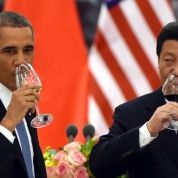Progressive lawmakers critical of the Obama administration's trade agenda are calling on the president to publicly release the draft text of the Trans-Pacific Partnership (TPP), which up until now has been negotiated behind closed doors.

Both Democrats and Republicans say if passed the deal would likely hurt U.S. job growth while also making other nations complicit in unfair or unequal labor, environmental and human rights standards.
A 2015 bipartisan poll from The Wall Street Journal and NBC News showed that 75 percent of U.S. citizens think that the TPP should be rejected or delayed.
RELATED: TPP Talks Kick Off in New York to Push NAFTA-Style Trade Deal by Jessa Boehner
However, proponents of the deal have tried to justify the massive trade agreement as a means to counter China’s rising economic influence, especially in in Latin America.
In several speeches,U.S. President Barack Obama has argued that if China is allowed to "write the rules" for global trade, U.S. workers and businesses will lose.
“If America doesn't shape the rules of the global economy today, to benefit our workers, while our economy is in a position of new global strength, then China will write those rules," Obama said at a speaking event last April.
Obama’s narrative about using trade policy to check China's influence aligns with conservative rhetoric from Republican leaders such as presidential candidate Jeb Bush and congressman Paul Ryan.
“And the United States has pulled back from the region [Latin America], and those voids are now being filled by new actors, most particularly China, that is seeking resources, not necessarily to inspire little 'L' liberalism," Bush said during a speech last February at the Chicago Council on Global Affairs.
Bush argued that the "withdrawal" of the U.S. from the region has left a "void" that China, which does not share the same economic principles as the United States, sought to fill.
"The stakes are high – because in the global economy, if you're not moving forward, you're falling behind,” Paul Ryan recently told congress. “China is negotiating trade deals all over the world, and they're trying to rig the rules in their favor. So it all comes down to this question: Is China going to write the rules of the global economy, or are we?"
However, the idea that a massive free market trade agreement could curb Chinese influence in the region, does not correspond with the experience of previous agreements such as the North American Free Trade Agreement (NAFTA).
Citing the NAFTA experience, Washington-based watchdog Public Citizen recently pointed out that since the trade pact took into affect, the U.S. share of goods imported to Mexico dropped from 70 percent to under 50 percent, while China’s share rose by more than 2,600 percent.
RELATED: TPP Negotiations at Critical Juncture by Jack Rasmus
After the U.S. signed similar bilateral trade pacts with eight other Latin American nations, China’s exports to Latin America soared more than 1,280 percent, while the U.S. saw only modest export growth, according to a public citizen press release.
The notion that the TPP could be a vehicle for reassertion of the U.S. in Latin American economics seems more far-fetched when considering the fact that U.S. negotiators have indicated that a final agreement could include a special docking provision that would allow for the inclusion of new member countries in future years. These include other major exporting nations including Korea, Thailand, the Philippines and China.
Some see the anti-Chinese foreign policy rhetoric as an attempt to distract U.S. citizens from the underlying economic issues at stake.
The U.S. desire to to reassert its dominance in the region through the introduction of free trade agreements is however buoyed by the nascent, but still weak state of affairs with respect to Latin American trade integration, especially the low levels of intra-regional trade. In 2014, only 19.2 percent of exports were destined for other countries in the region.
At the moment, Latin America’s multilateral trade integration blocs are looking for answers as to how to boost intra-regional trade given Latin America’s historic export model, which is largely based on a system that fulfills domestic and extra-regional demand.
In the meantime, as the region struggles to consolidate a well-coordinated and deeply institutionalized regional trade framework, Washington will undoubtedly enhance its efforts to promote U.S. backed trade deals such as the TPP. The United States already has bilateral free trade agreements with Mexico, Peru and Chile, all of which are participating in the TPP.
If signed, the TPP would mark a victory for U.S. imperialism, posing a major threat to the strengthening regional integration process by widening the scope of free-trade ideology while directing Latin American exports to foreign markets.
RELATED: teleSUR’s “Interviews from Washington” talks to Celeste Drake, trade specialist for the AFL-CIO, the largest federation of labor unions in the United States, about the TPP.